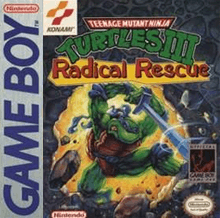Teenage Mutant Ninja Turtles III: Radical Rescue
| Teenage Mutant Ninja Turtles III: Radical Rescue | |
|---|---|
 North American cover art | |
| Developer(s) | Konami |
| Publisher(s) | Konami |
| Programmer(s) |
Yasufumi Fukui Masatsugu Nagata |
| Composer(s) | Akihiro Juichiya |
| Series | Teenage Mutant Ninja Turtles |
| Platform(s) | Game Boy |
| Release date(s) | |
| Genre(s) | Platform game, Metroidvania[1] |
| Mode(s) | Single player |
Teenage Mutant Ninja Turtles III: Radical Rescue, released as Teenage Mutant Hero Turtles III: Radical Rescue in Europe, and Teenage Mutant Ninja Turtles 3: Turtles Kiki Ippatsu (Teenage Mutant Ninja Turtles 3: タートルズ危機一発) in Japan, is a Game Boy game by Konami, released in November 1993. It is the third and final Game Boy game based on the Ninja Turtles, following Teenage Mutant Ninja Turtles: Fall of the Foot Clan and Teenage Mutant Ninja Turtles II: Back from the Sewers.
Story
The player begins the game by taking control of Michaelangelo, who must rescue the other turtles, along with Splinter and April O'Neil, who have been kidnapped by Shredder.[2] Unlike other games based on the franchise, this is a scrolling action-adventure game reminiscent of the Metroid and the later Castlevania: Symphony of the Night. Each turtle has a different ability which is necessary to finish the game. Michaelangelo can hover using his nunchakus as a helicopter, Leonardo can drill the floor by spinning with his katana, Raphael can hide himself inside his shell to enter passages that are otherwise too small to enter, and Donatello can stick to and climb walls.
The bosses are Scratch, Dirtbag, a Triceraton, Scale Tale, and Shredder (in this game known as Cyber-Shredder).
| Reception | ||||||||
|---|---|---|---|---|---|---|---|---|
| ||||||||
References
- ↑ Szczepaniak, John. "Backtracking: The History of Metroidvania". GamesTM (116). Imagine Publishing. pp. 148–53.
- ↑ "Teenage Mutant Ninja Turtles III: Radical Rescue (Game Boy)". Mobygames. 1993. Retrieved 1 December 2015.